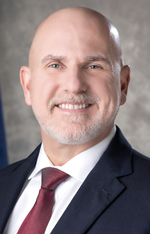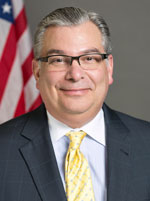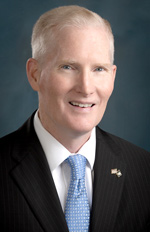By STU CLAMPITT

Baldwin
When the Highline project was on the agenda at the Aug. 16 Fishers City Council meeting, Councilwoman Jocelyn Vare raised multiple concerns including the fact that the company involved, Envoy, has State Senator Scott Baldwin as its CEO. Hamilton County residents have since been asking about multiple Envoy projects, so The Reporter spoke to city council members in both Fishers and Carmel about their most recent Envoy partnerships.
The Reporter’s attempts to reach Sen. Baldwin for comment were unsuccessful.
Fishers Highline Project ($10 million)
The Highline project is a private development to be located south of 106th Street between Lantern Road and Kincaid Boulevard. The project is supposed to involve apartments, restaurants and other amenities, which one councilmember compared to Fishers Marketplace. You can read the project agreement, which includes maps, a conceptual drawing, a list of prohibited businesses and other details at this link.
“I voted against the development project agreement between the City of Fishers and Envoy for several reasons,” Vare told the Reporter.

Vare
Vare said she was only given three business days’ notice that the Highline project would be heard, which she did not believe was sufficient time to “vet and consider the details of the development.” She also told the Reporter, “There was no substantive or meaningful justification for the $10 million investment in Tax Increment Financing [TIF] provided during the meeting. Having not been given the opportunity to fully evaluate the proposal prior to the meeting, I could not in good faith support it.”
Vare’s third concern involved the potential for conflict of interest.
“As chief executive officer of Envoy, Republican State Senator Scott Baldwin’s involvement in the project was not disclosed, which raises the question of a conflict of interest,” Vare said. “The possibility of such a conflict and the city’s financial support certainly warrants further scrutiny. But every Republican member of the Council remained silent and not one raised a concern. That should concern all of us. If the deal is indeed a good and fair one, the City should have welcomed vigorous discussion in front of the public. Elected officials have a fiduciary duty to the community, which means we must make decisions in the best interest of residents. Put simply, I was not convinced.”
Fishers City Councilman John Weingardt spoke against Vare’s concerns both at the meeting and in a conversation with The Reporter.
When asked specifically about not disclosing to the public that Sen. Baldwin is the CEO of the company that may be given $10 million in Fishers TIF money, Weingardt said it was not a concern.

Weingardt
“I guess I don’t see an issue because he’s got two other projects here in Fishers doing very well,” Weingardt told the Reporter. “Yes, he happens to be the state senator, no question about it, but you look at his credentials: As an entrepreneur, as a business owner, he’s been very successful. I look at the person who’s running the project. I look at character, I look at collateral, and I look at credit. I check all three of those boxes. Yes, he’s a state senator, but I also see that he’s been successful in real estate. He’s done very well. And I wish we had more elected officials like him.”
According to Weingardt, a TIF district allows a political jurisdiction to designate an area so all the taxes there are collected to use for infrastructure within that same area.
“This enables us to put together a project that’s much more robust than if we did not have any type of TIF financing whatsoever,” Weingardt said. “Good case in point: Go to Fishers Marketplace. If we did not have TIF we would not be able to have that level of quality that exists. We design our TIFs to put every safeguard in place that they don’t cause issues down the road for taxpayers. And this one won’t, in my opinion.”
It should be noted that the Highline project location is just outside the State Senate District 20 area, but other parts of Fishers are in District 20.
Envoy projects in Fishers have included Spark, Edge, and now Highline.
At the Aug. 16 meeting, the council agreed to the project for the financial agreement, but not for the required rezone. Public comments will be allowed when the Highline project comes before the Fishers Plan Commission, which meets the first Wednesday of each month at 6 p.m.
The Sept. 1 plan commission meeting was canceled. The city website does not yet have an agenda posted for the Oct. 6 meeting.
Carmel Police Headquarters ($38 million)
The Carmel Police Headquarters expansion is a very different project. This is not private development, but is classified as a “Build Operate Transfer” (BOT) under Indiana statue IC 5-23-3, which reads in part, “A governmental body may enter into a BOT agreement with an operator for the acquisition, planning, design, development, reconstruction, repair, maintenance, or financing of any public facility on behalf of the governmental body.”
BOT agreements are what some people call “no-bid contracts.” In this case, it will involve an estimated $38 million.
Sen. Baldwin’s company, Envoy, is being given this project. A portion of his district is inside Carmel city limits, but like the Fishers Highline development, the project itself is slightly outside his District 20 boundaries.
The Reporter spoke to Carmel City Council President Sue Finkam and Councilman Tim Hannon about the project, transparency regarding the concern over potential conflicts of interest, and the nature of BOT agreements.
BOT projects are not open for bidding in the normal sense of the word, but rather rely on a Request for Proposal and Qualification (RFPQ). The city is not required to give the project to the lowest bidder, but rather one which comes down to, according to Hannon, “intangibles.”
Envoy will build the facility, ensure it is functional, then hand it over to the city at the end. BOT projects also involve a guaranteed maximum cost. Any cost overruns are the responsibility of the contractor, not the city.

Hannon
“The police station expansion is unique in that it is a Build Operate Transfer process, which had never been done within Carmel and required actual legislative approval to be able to do that,” Hannon said. “One thing I also thought was very unique and I was very much in favor of: the process is apolitical. There was a very specific line in the proposal packets that went out that said anyone bidding on this could not directly contact anyone on the decision-making team.”
The decision-making team included Councilman Hannon, Carmel Police Chief Jim Barlow, Deputy Chief Jeff Horner, Director of Communication James Crider, Deputy Director of Redevelopment Jenell Fairman and City Judge Brian Poindexter.
“It also said they could not contact any elected officials either, which would include the mayor and city council, and if they did contact either elected officials or anyone in the decision-making process they would actually be eliminated from consideration. So that, to me, I believe is unique in the process as well. That puts politics out of it, and in fact if there is any ‘politicking’ so to speak, it would disqualify any vendor associated with that. I thought that was significant for the process.”
According to Hannon, this BOT project is a chance at redemption for Carmel.
“It’s particularly timely because we really screwed up the Hotel Carmichael project so badly,” Hannon said. “Everything that could go wrong and could be done wrong went sideways. This I think is our chance to kind of redeem ourselves.”

Finkam
When asked about BOT’s being a so-called no-bid contract, Finkam told the Reporter, “It went through an extended bid process. That is how I would say it. It went through an extended one where they put out an RFPQ. The vendors were pre-qualified. They put in a bid with the maximum guaranteed price and then they were interviewed. So it’s a better process than the regular process. It’s not like we just select somebody like the mayor can do for the engineering, where they can just select anybody they want. This is a more defined process. And it has penalties in it so they could not talk to anybody about it during the bidding process.”
The Reporter also asked Finkam why, in the interest of transparency, Baldwin’s connection to Envoy was not communicated to the public during this process.
“I guess I don’t feel any need to communicate it to the public,” Finkam told the Reporter. “From a city council standpoint, the company was vetted through the RFPQ process. I have never heard that he was involved. To me it is a non-issue. The company is either qualified or they’re not. Every one of us has the opportunity to have a different job. His position didn’t give him a leg up.”
Finkam used the example of her own company and how there is no statutory prohibition against her bidding for city work if she were to choose to.
“I should still have the opportunity to bid for city work,” Finkam said. “I haven’t, but I should have an opportunity for city work because they are a large employer, and if I wanted to try for it, I should be able to do that and be evaluated equally. I don’t see anything wrong with it, but I understand how other people might.”
It should be noted that Finkam has not, in fact, ever bid for work in the political subdivision where she is an elected official.
“As long as all the rules are followed it’s a non-issue to me,” Finkam said. “This particular bidding process was all done publicly. I want to be clear about that. Just because it did not go through the regular bid process doesn’t mean it wasn’t A) public and B) highly scrutinized. It had more eyes on it than most of our other projects would have.”
Hannon told The Reporter he had no idea Sen. Baldwin is Envoy’s CEO.
“I would just say for myself, I was not aware of that, which shows you how politically naïve I am,” Hannon told the Reporter. “I didn’t know the head of Envoy actually was a state senator. I can’t speak for the other folks on that. I don’t know. There must not be any prohibition for him to be able to bid on that.”
Hannon is correct, as was Finkam, that there is no statutory prohibition against an elected official owning a business that bids on a project in their own political subdivision.
At a June 21 Carmel City Council meeting discussing Envoy as the contractor for the $38 million police station project, Hannon said it came down to “intangibles,” to “who would stakeholders be most comfortable with in selection.”
In this case, it was a company whose CEO happens to be a local state-level elected official.

Baldwin gave $6000 to Scott Fadness in 2020, and Envoy Real Estate gave him $500. Envoy gave him $2000 in 2019.